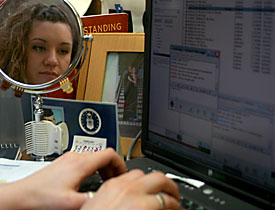 |
|
DAVID HARDEN/Arizona Daily Wildcat
|
Business management freshman Lexi Sonne downloads music using a program called KaZaa last week in her dorm room. Sonne is one of many users of a program that allows users to easily access and share music, software and many other types of files.
|
|
By Arek Sarkissian II
Arizona Daily Wildcat
Tuesday February 25, 2003
Residence Life decides on a lesser punishment
Residence Life has slimmed down on the punishment for illegal music sharing practices in the residence halls due to increased volume, officials said.
Instead of writing a three-page paper on copyright law, first-time offenders will receive warning letters from Residence Life, said Steve Gilmore, assistant director for Residence Life.
The warning letters alert students that the material they downloaded violates copyright restrictions and should be removed immediately.
Gilmore said that increased usage as well as a steady flow of written complaints from music companies prompted him to change the policy.
"A lot of students that were coming in here just didn't know about the law. We decided it's probably better to use the warning letter, using it as an educational tool," he said.
Gilmore said music companies are closely searching trading programs such as KaZaa, Morpheus and Limewire for UA Internet provider addresses.
KaZaa or Sharman Networks filed a counter claim in late January against several recording labels and movie studios that are accusing the file-sharing network of providing free access to millions of copyrighted video and music files, according to CNN.
"They really don't have a leg to stand on to police our network; but if they can identify people who are in violation, then we're obligated to act on it," Gilmore said.
Gilmore could not specify how many complaints his office has received or the number of students who have been found in violation because the numbers are so large, he said.
While the consequences for first-time offenders have changed, those for second-time offenders remain the same. They face the loss of network access privileges at the university for the rest of their academic careers.
Any second offenses would also be reported to the Dean of Students office, Gilmore said.
Gilmore added that no students living in the dorms have been charged with a second offense.
But students don't have to live on campus to be punished for a second offense, as the policy applies to all students using campus computers.
Gilmore said Residence Life has begun taking small steps toward making music sharing difficult on the network, including blocking users outside of the UA network from obtaining otherwise sharable materials through the network.
"We're taking some steps on the network to throttle back the effect that the students' machines have," he said. "You can't be outside and make a connection to the university."
Dave Perkin, a management information systems junior, said that the university could do more to stop the problem by completely blocking access to connection ports used by file sharing servers.
"They could do that, but the university just doesn't care," Perkin said.
Ted Frohling, a CCIT network systems analyst, said that while his department is still contending with the baud-rate-gobbling issue as well, the letters his office receives from music companies are directed to the university attorney's office.
Frohling said blocking access to Web sites does not coincide with the UA's educational goals.
"We're an educational institution · we don't generally restrict content, we don't censor," he said.
Mitchell Wherry, a Manzanita-Mohave resident and pre-business freshman, said that while access to Web sites at the university shouldn't be restricted, the cons of music sharing outweigh the pros.
"Music should be appreciated and not exploited. If I really liked a band, I'd want to support them and pay the $15 for the CD," Wherry said.
Still, for those who are determined to continue downloading music for free, there are other ways to elude the system.
Manzanita-Mohave resident and undecided sophomore Emily Chiarelli has her own way of avoiding the prying eyes of music companies: She doesn't let anyone else upload from her computer.
"It's really not that hard to get around," Chiarelli said.
Brian Caracappa, a media arts sophomore, approved of the lessened penalty for first-time offenders.
"I've had friends that had to write the three-page paper. It really didn't do anything for them," Caracappa said.
Caracappa said his friends haven't been caught again, but they still continue to download music just as they were in the past.

